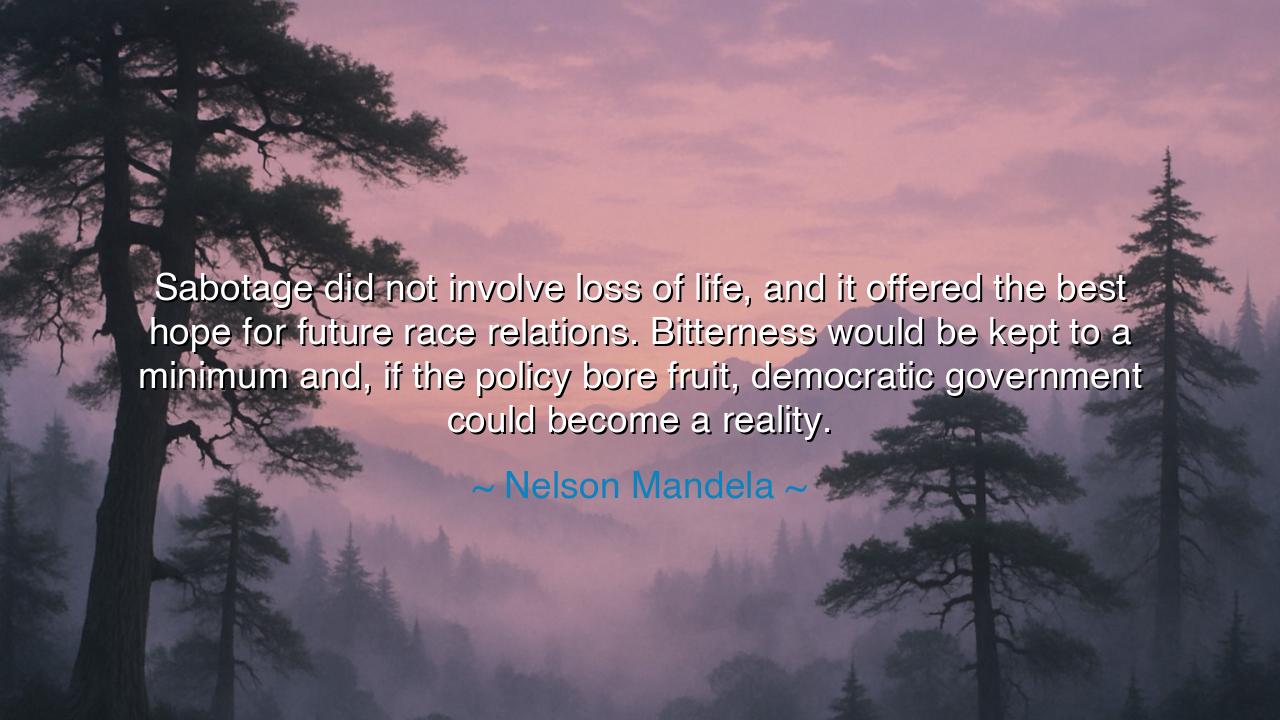
Sabotage did not involve loss of life, and it offered the best
Sabotage did not involve loss of life, and it offered the best hope for future race relations. Bitterness would be kept to a minimum and, if the policy bore fruit, democratic government could become a reality.






The great liberator Nelson Mandela, a man whose life was both flame and light, once wrote these measured and powerful words: “Sabotage did not involve loss of life, and it offered the best hope for future race relations. Bitterness would be kept to a minimum and, if the policy bore fruit, democratic government could become a reality.” These words were not spoken in ease nor in triumph, but in the shadow of oppression, when his people were chained by the cruelty of apartheid and his own freedom was but a memory. They reveal the mind of a man who had seen the abyss of hatred and yet chose the path of wisdom — a path that sought not destruction but transformation. Mandela’s words are the testament of a warrior who understood that true victory is not in vengeance, but in the preservation of human dignity for both the oppressed and the oppressor.
In the manner of the ancients, let us look deeply into the spirit of these words. When Mandela speaks of “sabotage”, he does not glorify violence, nor does he call for chaos. He speaks of resistance guided by restraint — a deliberate and moral struggle against tyranny without the taking of innocent life. He and his comrades in the African National Congress had long sought peaceful reform; yet the doors of dialogue had been sealed shut by a government deaf to justice. Thus, Mandela chose a third way: a form of defiance that would shake the foundations of apartheid’s machinery while refusing to stain their cause with blood. It was rebellion guided by conscience, resistance tempered by compassion — a strategy born not from anger, but from wisdom.
The origin of this quote lies in the early 1960s, when Mandela and his companions formed Umkhonto we Sizwe — the “Spear of the Nation.” This was not an army of destruction, but of disruption. They turned to sabotage as the least harmful method of forcing change. Power stations, military installations, and government facilities became their targets, not people. Mandela understood that every revolution faces a choice: to destroy or to enlighten. He chose enlightenment — not because he was weak, but because he believed that the seeds of bitterness, once planted, would poison the future. The goal was not merely to defeat apartheid, but to create a South Africa where all, black and white alike, could walk as equals.
Consider the depth of his vision: even in the midst of injustice, Mandela’s eyes were fixed not on revenge but on reconciliation. He knew that hatred could win battles but would never win peace. Like the wise generals of old who sought victory without slaughter, he understood that the greatest triumph is to win without sowing hatred. By choosing sabotage instead of terror, he preserved the moral purity of his cause and kept open the path toward future democracy. In the years to come, when apartheid finally fell and South Africa faced the daunting task of rebuilding, it was this foresight — this refusal to let bitterness take root — that made forgiveness possible.
In his life we see the living truth of his own words. For twenty-seven long years in prison, Mandela endured humiliation, isolation, and suffering. Yet when the chains were finally broken, he did not emerge thirsting for revenge. Instead, he built the Truth and Reconciliation Commission, where victims and perpetrators alike could confront the past, confess their wrongs, and begin the painful work of healing. This was the flowering of the very seed he had planted decades before — the belief that if one fights with compassion, the future will not be built on ashes but on understanding. His vision was vindicated: South Africa, though imperfect, became a democracy not through blood, but through grace.
O children of tomorrow, take this teaching to heart: anger can destroy, but wisdom can redeem. When faced with injustice, do not let hatred guide your hand. Resist, yes — but resist in such a way that your soul remains unbroken. Let your struggle aim not only to defeat evil, but to transform it. Mandela’s choice of sabotage over slaughter teaches that courage is not only in the fist, but in the restraint of the heart. For even the just cause can be stained if pursued through cruelty. To keep one’s humanity in times of darkness is the highest form of strength.
And so, let the lesson be engraved upon your spirit: justice without mercy becomes tyranny, but mercy without justice becomes surrender. True leadership balances both. If you seek to build a better world — in your nation, your community, or your own heart — remember Mandela’s path. Speak truth to power, but let compassion temper your wrath. Fight fiercely, but never forget the humanity of those who stand against you. For when your cause bears fruit, may it feed not bitterness but healing, not division but democracy, not vengeance but peace. In this balance, as Mandela knew, lies the destiny of all who would change the world.






AAdministratorAdministrator
Welcome, honored guests. Please leave a comment, we will respond soon